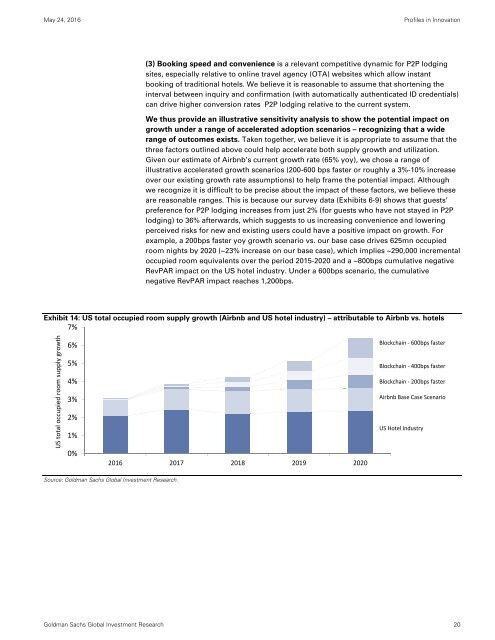PROFILES INNOVATION
Goldman-Sachs-report-Blockchain-Putting-Theory-into-Practice
Goldman-Sachs-report-Blockchain-Putting-Theory-into-Practice
You also want an ePaper? Increase the reach of your titles
YUMPU automatically turns print PDFs into web optimized ePapers that Google loves.
May 24, 2016<br />
Profiles in Innovation<br />
(3) Booking speed and convenience is a relevant competitive dynamic for P2P lodging<br />
sites, especially relative to online travel agency (OTA) websites which allow instant<br />
booking of traditional hotels. We believe it is reasonable to assume that shortening the<br />
interval between inquiry and confirmation (with automatically authenticated ID credentials)<br />
can drive higher conversion rates P2P lodging relative to the current system.<br />
We thus provide an illustrative sensitivity analysis to show the potential impact on<br />
growth under a range of accelerated adoption scenarios – recognizing that a wide<br />
range of outcomes exists. Taken together, we believe it is appropriate to assume that the<br />
three factors outlined above could help accelerate both supply growth and utilization.<br />
Given our estimate of Airbnb’s current growth rate (65% yoy), we chose a range of<br />
illustrative accelerated growth scenarios (200-600 bps faster or roughly a 3%-10% increase<br />
over our existing growth rate assumptions) to help frame the potential impact. Although<br />
we recognize it is difficult to be precise about the impact of these factors, we believe these<br />
are reasonable ranges. This is because our survey data (Exhibits 6-9) shows that guests’<br />
preference for P2P lodging increases from just 2% (for guests who have not stayed in P2P<br />
lodging) to 36% afterwards, which suggests to us increasing convenience and lowering<br />
perceived risks for new and existing users could have a positive impact on growth. For<br />
example, a 200bps faster yoy growth scenario vs. our base case drives 625mn occupied<br />
room nights by 2020 (~23% increase on our base case), which implies ~290,000 incremental<br />
occupied room equivalents over the period 2015-2020 and a ~800bps cumulative negative<br />
RevPAR impact on the US hotel industry. Under a 600bps scenario, the cumulative<br />
negative RevPAR impact reaches 1,200bps.<br />
Exhibit 14: US total occupied room supply growth (Airbnb and US hotel industry) – attributable to Airbnb vs. hotels<br />
7%<br />
US total occupied room supply growth<br />
6%<br />
5%<br />
4%<br />
3%<br />
2%<br />
1%<br />
0%<br />
2016 2017 2018 2019 2020<br />
Blockchain ‐ 600bps faster<br />
Blockchain ‐ 400bps faster<br />
Blockchain ‐ 200bps faster<br />
Airbnb Base Case Scenario<br />
US Hotel Industry<br />
Source: Goldman Sachs Global Investment Research.<br />
Goldman Sachs Global Investment Research 20


